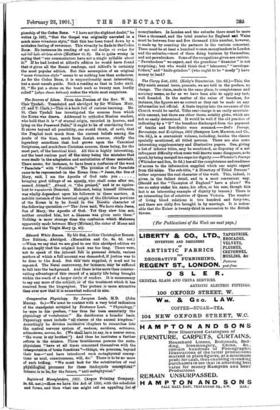The Clergy List, 1901. (Kelly's Directories. 12s. 6d.)-This, the fifty-ninth
annual issue, presents, we are told in the preface, no change. The claim, made in the same place, to completeness and accuracy seems, as far as we have been able to apply any test, well founded. In the matter of the _value of benefices, for instance, the figures are as correct as they can be made on any information not official. A State inquiry into the revenues of the Church would be useful. Tithe rent-charge is an easily ascertain- able amount, but there are other items, notably glebe, which are not so easily determined. It would be well if the old practice of indicating by a " D " the benefices discharged from the payment of tenths and first-fruits were resumed,-Dod's Peerage, Baronektge; and Kwightage, 1901 (Sampson Low, Marston, and Co., 10s. 6d.), is a convenient volume, including, besides the classes specially mentioned, all titled- persons. There are also some interesting supplementary and illustrative papers. One, giving a list of inferior titles, may be mentioned, as disposing of a not infrequent difficulty when some well-known name disappears, so to speak,by being merged in a supet ior dignity. —Whstaker's Peerage (Whitaker and Son, 2s 6d.) has all the completeness and readiness of access to the information supplied which one might expect from tile nano. The sub-title, "A Directory of Titled Persons" better expresses the real character of the work. This, indeed, is given_ in the fullest detail, and in a most convenient way. (Should not the "Champion of England" have a place ? We see no entry under_ his name, his office,_ or his seat, though this last is an interesting example of dignity by tenure.) There is an interesting list of relatives of Queen Victoria. The number of living blood relations_ is two hundred and forty-two, and there are shay-five brought in by marriage. It is notice- able that the Kaiser is twenty-third in succession to the British throne.






































 Previous page
Previous page